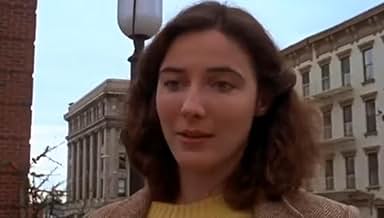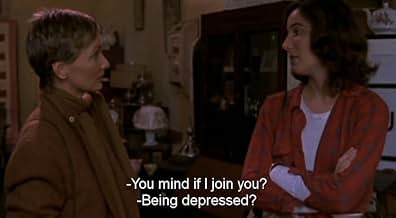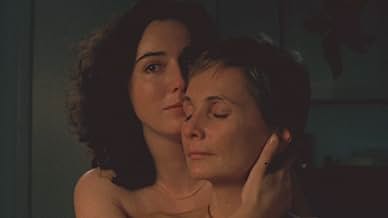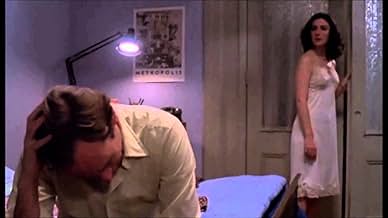NOTE IMDb
6,9/10
1,9 k
MA NOTE
Une femme mariée et heureuse se rend compte qu'elle est une lesbienne réprimée après avoir eu une liaison avec une professeure d'université, puis essaie de se réconcilier avec son nouveau st... Tout lireUne femme mariée et heureuse se rend compte qu'elle est une lesbienne réprimée après avoir eu une liaison avec une professeure d'université, puis essaie de se réconcilier avec son nouveau style de vie.Une femme mariée et heureuse se rend compte qu'elle est une lesbienne réprimée après avoir eu une liaison avec une professeure d'université, puis essaie de se réconcilier avec son nouveau style de vie.
Jessica MacDonald
- Theda
- (as Jessica Wight MacDonald)
Avis à la une
Lianna (Rachel Griffiths) is unhappily married to a cheating husband (John De Vries) and has two children. She falls for a female teacher (Jane Hallaren) and realizes she's a lesbian. She starts an affair with her and realizes she can't stay with her husband...she must find her own identity as a lesbian.
It's hard to believe this was made in 1983. Definitely a ground breaker. I remember it played forever in a small art house cinema in Cambridge MA. I didn't see it back then but I'm glad I got the chance. BTW, it was beautifully restored in 2003 and that's the print I saw. John Sayles wrote and directed the film and, like all his films, it has incredible dialogue and a believable script. This is probably the first realistic film to show a woman coming to grips with her sexual orientation--and embracing it completely. It does show the hardships she goes through adjusting to a life on her own and the relationship problems--but that's very true to life. The trip to a lesbian bar was surprising in a film this old. The acting by the leads is superb--Griffiths is perfect and Hallaren matches her. De Vries is good also but he's stuck with a 1 dimensional villain role. The supporting roles are somewhat amateurish--but they don't lessen the film. In fact it makes it seem even more realistic! The sex scenes are explicit but tasteful.
It's hard to believe a man wrote and directed such a sensitive portrayal of a woman. My only complaint is that it's a bit overlong--but this still should be seen. A groundbreaking and very honest film. An 8 all the way.
It's hard to believe this was made in 1983. Definitely a ground breaker. I remember it played forever in a small art house cinema in Cambridge MA. I didn't see it back then but I'm glad I got the chance. BTW, it was beautifully restored in 2003 and that's the print I saw. John Sayles wrote and directed the film and, like all his films, it has incredible dialogue and a believable script. This is probably the first realistic film to show a woman coming to grips with her sexual orientation--and embracing it completely. It does show the hardships she goes through adjusting to a life on her own and the relationship problems--but that's very true to life. The trip to a lesbian bar was surprising in a film this old. The acting by the leads is superb--Griffiths is perfect and Hallaren matches her. De Vries is good also but he's stuck with a 1 dimensional villain role. The supporting roles are somewhat amateurish--but they don't lessen the film. In fact it makes it seem even more realistic! The sex scenes are explicit but tasteful.
It's hard to believe a man wrote and directed such a sensitive portrayal of a woman. My only complaint is that it's a bit overlong--but this still should be seen. A groundbreaking and very honest film. An 8 all the way.
A woman develops romantic feelings for her (female) child psychology professor. A love affair ensues, and Lianna's life is transformed.
John Sayles' film is an attractive, well-made piece, perceptively analysing character and relationships in the claustrophobic atmosphere of a small-town college campus. The location looks like upstate New York (Sayles is a native of Schenectady).
Lianna Massey is in her 30's and she has allowed life to happen to her. As a college student she drifted into a relationship with her teacher, Dick. Now she is married to him and they have two children. We see her doing the dull rounds, picking up the kids and waiting at the back of Dick's class to give him a ride home. Alone after the students leave, Lianna and Dick do not embrace. This is a loveless marriage. When Dick complains about Lianna entering his class, she hits back with, "Afraid you'll let them see you playing husband?" We now have Dick's measure. He is a philanderer who preys on undergraduates for sex.
Dick has exploited Lianna's passivity, shaping the marriage to his own advantage. Even the children are named after his favourite movie stars (Dick lectures in Film Studies). He attends campus parties alone, reasoning that he has to be seen at these functions if he is to get tenure. In fact, he is busy chasing student skirt. When Lianna shows up at one party unannounced and sees him romping in the sand box, her last bond of loyalty towards him is severed.
Ruth Brennan is an impressive woman. In her late 40's and a professor of Child Psychology, she is bright, good-looking and stylish, with plenty of wisdom and poise. She teaches an evening class for campus moms, and this is where Lianna meets her. Drawn to the urbane, understanding Ruth, Lianna makes clumsy attempts to ingratiate herself, offering to work as a research assistant and compiling lists of children's literature. While Dick is out of town attending the Toronto Film Festival, Lianna takes the opportunity to have dinner at Ruth's place.
Ruth is an experienced lesbian, but Lianna is not yet even aware that this is where the friendship is heading. As she prepares for the dinner date, we see Lianna decide, on a whim, to go bra-less. Her feelings are as yet inchoate, but we know that the relationship is about to become sexual.
The two women become lovers, but things do not work out as cosily as the naive Lianna had expected. She burns her boats with Dick, who shows that his hard intellect is coupled with a phenomenal mean streak. Lianna's friend Sandy, uncomprehendingly conventional in her outlook, rejects her. Even more ominously, Ruth proves to be an aloof, calculating lover. Lianna is dismayed to find that she can't move in with Ruth, because it would cause a scandal "here in faculty land". Suddenly Lianna is confronted with the stark reality of her new situation: her children stay with Dick while she has to find herself a job and a place to live. Ruth ends the research assistant arrangement, saying that it is inappropriate for a bed partner to be an employee. She asks Lianna not to call her by her first name in class. Worse still, Lianna learns of "the woman back home", Ruth's long-standing lover, who is still very much on the scene.
As the affair with Ruth fades and withers, Lianna has to feel her way painfully towards a new life for herself. We see her alone in her empty apartment, the plaintive whistle of the kettle representing the dull ache of her unhappiness. She has to cope with a dead-end job and brainless colleagues, having forsaken the easy life of a faculty mom and the sparkling wit of campus society. Her TV set becomes her life, the lame soap opera dialogue echoing her words to Ruth. The girl in the launderette is reading "The Well Of Loneliness". Lianna's meetings with her children are agonising for all concerned. Jerry the campus stud (played by Sayles) calls on the company-starved Lianna. She is delighted to see him until she realises that he is a shark, trying to exploit her vulnerability. When he is rebuffed, Jerry (typically) misses the point and rationalises it in self-referential terms: "My technique must be getting ragged."
Early on in the affair, Ruth had taken Lianna to a gay bar. The 'naughtiness' and the excitement of it had been a liberating experience for the Alberta girl. Now, she heads back to the bar merely to slough off her loneliness. When she ends up in bed with Cindy of the Women's Air Corps, Cindy points out that the two of them have little in common. "We have enough," replies Lianna bleakly.
There are plenty of strikingly clever moments in this impressive film. Sayles' crash-edited blackboard trick is memorable. Later, students try to film a drinks party, and Sayles comments ironically on their attempt by shooting the scene with a handheld camera. The dance show which Lianna stage-manages is a neat dramatisation of her predicament, and the beautiful Otis Redding music entirely apposite. The children are shown brilliantly to be 'in the middle' of the marriage breakdown as they sit on the sofa, eyes darting back and forth between mom and dad, like tennis spectators.
The telephone is used cleverly to symbolise communication breakdown. Dick slams the receiver down, signifying the death of the marriage, and Lianna fails to get any answers as she phones out from her beleaguered apartment.
John Sayles' film is an attractive, well-made piece, perceptively analysing character and relationships in the claustrophobic atmosphere of a small-town college campus. The location looks like upstate New York (Sayles is a native of Schenectady).
Lianna Massey is in her 30's and she has allowed life to happen to her. As a college student she drifted into a relationship with her teacher, Dick. Now she is married to him and they have two children. We see her doing the dull rounds, picking up the kids and waiting at the back of Dick's class to give him a ride home. Alone after the students leave, Lianna and Dick do not embrace. This is a loveless marriage. When Dick complains about Lianna entering his class, she hits back with, "Afraid you'll let them see you playing husband?" We now have Dick's measure. He is a philanderer who preys on undergraduates for sex.
Dick has exploited Lianna's passivity, shaping the marriage to his own advantage. Even the children are named after his favourite movie stars (Dick lectures in Film Studies). He attends campus parties alone, reasoning that he has to be seen at these functions if he is to get tenure. In fact, he is busy chasing student skirt. When Lianna shows up at one party unannounced and sees him romping in the sand box, her last bond of loyalty towards him is severed.
Ruth Brennan is an impressive woman. In her late 40's and a professor of Child Psychology, she is bright, good-looking and stylish, with plenty of wisdom and poise. She teaches an evening class for campus moms, and this is where Lianna meets her. Drawn to the urbane, understanding Ruth, Lianna makes clumsy attempts to ingratiate herself, offering to work as a research assistant and compiling lists of children's literature. While Dick is out of town attending the Toronto Film Festival, Lianna takes the opportunity to have dinner at Ruth's place.
Ruth is an experienced lesbian, but Lianna is not yet even aware that this is where the friendship is heading. As she prepares for the dinner date, we see Lianna decide, on a whim, to go bra-less. Her feelings are as yet inchoate, but we know that the relationship is about to become sexual.
The two women become lovers, but things do not work out as cosily as the naive Lianna had expected. She burns her boats with Dick, who shows that his hard intellect is coupled with a phenomenal mean streak. Lianna's friend Sandy, uncomprehendingly conventional in her outlook, rejects her. Even more ominously, Ruth proves to be an aloof, calculating lover. Lianna is dismayed to find that she can't move in with Ruth, because it would cause a scandal "here in faculty land". Suddenly Lianna is confronted with the stark reality of her new situation: her children stay with Dick while she has to find herself a job and a place to live. Ruth ends the research assistant arrangement, saying that it is inappropriate for a bed partner to be an employee. She asks Lianna not to call her by her first name in class. Worse still, Lianna learns of "the woman back home", Ruth's long-standing lover, who is still very much on the scene.
As the affair with Ruth fades and withers, Lianna has to feel her way painfully towards a new life for herself. We see her alone in her empty apartment, the plaintive whistle of the kettle representing the dull ache of her unhappiness. She has to cope with a dead-end job and brainless colleagues, having forsaken the easy life of a faculty mom and the sparkling wit of campus society. Her TV set becomes her life, the lame soap opera dialogue echoing her words to Ruth. The girl in the launderette is reading "The Well Of Loneliness". Lianna's meetings with her children are agonising for all concerned. Jerry the campus stud (played by Sayles) calls on the company-starved Lianna. She is delighted to see him until she realises that he is a shark, trying to exploit her vulnerability. When he is rebuffed, Jerry (typically) misses the point and rationalises it in self-referential terms: "My technique must be getting ragged."
Early on in the affair, Ruth had taken Lianna to a gay bar. The 'naughtiness' and the excitement of it had been a liberating experience for the Alberta girl. Now, she heads back to the bar merely to slough off her loneliness. When she ends up in bed with Cindy of the Women's Air Corps, Cindy points out that the two of them have little in common. "We have enough," replies Lianna bleakly.
There are plenty of strikingly clever moments in this impressive film. Sayles' crash-edited blackboard trick is memorable. Later, students try to film a drinks party, and Sayles comments ironically on their attempt by shooting the scene with a handheld camera. The dance show which Lianna stage-manages is a neat dramatisation of her predicament, and the beautiful Otis Redding music entirely apposite. The children are shown brilliantly to be 'in the middle' of the marriage breakdown as they sit on the sofa, eyes darting back and forth between mom and dad, like tennis spectators.
The telephone is used cleverly to symbolise communication breakdown. Dick slams the receiver down, signifying the death of the marriage, and Lianna fails to get any answers as she phones out from her beleaguered apartment.
Writer/director John Sayles went with this film where few other directors would have dared to venture at that time. His Lianna is a film dealing with the coming out of a young woman in the midst of a failing marriage. Lianna is a 33 year old woman married to a self-centered college teacher and mother of two children. Though her family does not seem to greatly prosper, it would appear on the surface that Lianna lives a comfortable life. Just when her husband pushes things too far, Lianna starts up a sexual relationship with her night school teacher. Lianna cares enough for this woman that she becomes openly gay, and moves out of her home. She quickly learns that her coming out may cause more problems than she originally bargained for.
First of all, she is forced to live in a tiny apartment and financially support herself. The job market of this college town seems weak, and there isn't much out there in terms of decent employment. As one might expect, Lianna's children are somewhat alienated by their mother's new lifestyle. Their father no doubt helps further the alienation. Lianna's best friend no longer wishes to speak to her. And perhaps worst of all, the woman she came out for, does not wish to be committed to her. She has another woman in another town she is still very much in love with. The rest of the film deals with Lianna coming to terms with her new lifestyle, and trying her best to fight off her sudden loneliness and isolation.
John Sayles, who even plays a supporting part, does a very good job with the material. He had to make this film on a budget of less than half a million dollars, and all of that pretty much came from private donors. The film ends up looking pretty good, but many of the locations are somewhat bleak in appearance. Sayles handles perhaps the most important scene with very good tact. In it, Lianna is trying to come out to Ruth (the teacher) without actually saying it point blank. Ruth is clearly attracted to Lianna, but she obviously fears making a move before she is sure that's what Lianna wishes. Notice how she delicately moves her hand through Lianna's hair as Lianna details a close relationship with a female friend at summer camp. And yes, there are numerous sex scenes. On the surface, this type of film might sound like exploitation, but Sayles doesn't let it slip into that territory. He allows his characters to keep their dignity, and we the audience care deeply about them before its over.
The film is not necessarily about the triumphs and empowerment of coming out. Lianna in fact seems mostly miserable once she allows herself to be honest about her sexuality. That makes this film a somewhat depressing endeavor. Only in the film's final scene is there any sliver of hope that the protagonist can gain acceptance from someone was alienated by her change of lifestyle. The film stumbles a bit in terms of how it handles Lianna's relationship with her husband. He is shown to us as being a truly reprehensible slug from the beginning. I think it would have been more interesting to show him as being either likable or at the very worst simply inattentive. Being as though we already know what a jerk he is, there really isn't any where else the story can go with him. Maybe it would have been more interesting to show how a more typical man would have reacted to his wife coming out. Just a thought.
Overall this is a daring and thoughtful film. Linda Griffiths is particularly outstanding as the title character, and the rest of the cast is fairly convincing as well. The film scores points for dealing with its characters as well-defined individuals, rather than simple stereotypes. If you can find a copy of this little-known film, by all means give it a look. 8 of 10 stars.
The Hound.
First of all, she is forced to live in a tiny apartment and financially support herself. The job market of this college town seems weak, and there isn't much out there in terms of decent employment. As one might expect, Lianna's children are somewhat alienated by their mother's new lifestyle. Their father no doubt helps further the alienation. Lianna's best friend no longer wishes to speak to her. And perhaps worst of all, the woman she came out for, does not wish to be committed to her. She has another woman in another town she is still very much in love with. The rest of the film deals with Lianna coming to terms with her new lifestyle, and trying her best to fight off her sudden loneliness and isolation.
John Sayles, who even plays a supporting part, does a very good job with the material. He had to make this film on a budget of less than half a million dollars, and all of that pretty much came from private donors. The film ends up looking pretty good, but many of the locations are somewhat bleak in appearance. Sayles handles perhaps the most important scene with very good tact. In it, Lianna is trying to come out to Ruth (the teacher) without actually saying it point blank. Ruth is clearly attracted to Lianna, but she obviously fears making a move before she is sure that's what Lianna wishes. Notice how she delicately moves her hand through Lianna's hair as Lianna details a close relationship with a female friend at summer camp. And yes, there are numerous sex scenes. On the surface, this type of film might sound like exploitation, but Sayles doesn't let it slip into that territory. He allows his characters to keep their dignity, and we the audience care deeply about them before its over.
The film is not necessarily about the triumphs and empowerment of coming out. Lianna in fact seems mostly miserable once she allows herself to be honest about her sexuality. That makes this film a somewhat depressing endeavor. Only in the film's final scene is there any sliver of hope that the protagonist can gain acceptance from someone was alienated by her change of lifestyle. The film stumbles a bit in terms of how it handles Lianna's relationship with her husband. He is shown to us as being a truly reprehensible slug from the beginning. I think it would have been more interesting to show him as being either likable or at the very worst simply inattentive. Being as though we already know what a jerk he is, there really isn't any where else the story can go with him. Maybe it would have been more interesting to show how a more typical man would have reacted to his wife coming out. Just a thought.
Overall this is a daring and thoughtful film. Linda Griffiths is particularly outstanding as the title character, and the rest of the cast is fairly convincing as well. The film scores points for dealing with its characters as well-defined individuals, rather than simple stereotypes. If you can find a copy of this little-known film, by all means give it a look. 8 of 10 stars.
The Hound.
When John Sayles makes a film, it's usually because he has a very good reason. A man who's made his life in film averting the Hollywood approach, Sayles stories are densely layered character dramas, unencumbered with camera tricks, special effects, or deception.
The idea that Lianna (Linda Griffiths) needs a change of life in and of itself is not surprising. As a young college student, she had succumbed to the advances of one of her professors, then quit school to marry him. Now, twelve years and two children later she finds her life mundane, and loveless. She needs a change.
A John Sayles film is a personal experience. He leads us down a road deluged with emotion, conflict and only some spattering of resolve. The rest he leaves for us. Sometimes we have to fill in the blanks to even the most difficult questions posed. And there's nothing wrong with that.
The idea that Lianna (Linda Griffiths) needs a change of life in and of itself is not surprising. As a young college student, she had succumbed to the advances of one of her professors, then quit school to marry him. Now, twelve years and two children later she finds her life mundane, and loveless. She needs a change.
A John Sayles film is a personal experience. He leads us down a road deluged with emotion, conflict and only some spattering of resolve. The rest he leaves for us. Sometimes we have to fill in the blanks to even the most difficult questions posed. And there's nothing wrong with that.
The previous review did a great job in outlining the movie.
One additional comment: This movie joints "Desert Hearts" and "If these walls could talk 2" in the pantheon of movies with the best romantic scenes between women.
One additional comment: This movie joints "Desert Hearts" and "If these walls could talk 2" in the pantheon of movies with the best romantic scenes between women.
Le saviez-vous
- AnecdotesJohn Sayles had written the screenplay for this film before writing the screenplay for his debut film, Return of the Secaucus Seven (1979). Sayles failed to get funding for a film about a lesbian love affair in the 1970s, and those who felt comfortable with the material were not comfortable with the film being directed by a man. So, Sayles put the Lianna (1983) screenplay on hold until gaining success with his two first films, Return of the Secaucus Seven (1979) and Hello baby (1983).
- Crédits fousThe opening credits credit only the production company and the crew members. The cast is not credited until the end credits. The title of the film, LIANNA, appears as the last title card after John Sayles is credited as writer, producer, director and editor.
- ConnexionsFeatured in Celluloid Closet (1995)
Meilleurs choix
Connectez-vous pour évaluer et suivre la liste de favoris afin de recevoir des recommandations personnalisées
- How long is Lianna?Alimenté par Alexa
Détails
Box-office
- Budget
- 300 000 $US (estimé)
- Montant brut aux États-Unis et au Canada
- 1 530 839 $US
- Montant brut mondial
- 1 530 839 $US
Contribuer à cette page
Suggérer une modification ou ajouter du contenu manquant

























